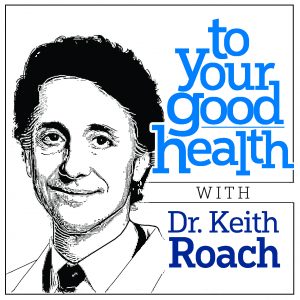TO YOUR GOOD HEALTH: Reader seeks alternative to Rx antidepressant
By Dr. Keith Roach — August 23, 2021 DEAR DR. ROACH: I suffer from depression. It comes and goes, but I’ve been feeling sad, worried and angry, as well as irritable, for the past four months or so. I force myself to function. My family doctor prescribed a 37.5 mg dose of Effexor once a day to start and after one week, twice a day. I looked up the side effects and what I read scared me. Instead, I’ve been taking 1,000 mg of St. John’s wort daily for almost three weeks, and I have noticed no discernible effect.
DEAR DR. ROACH: I suffer from depression. It comes and goes, but I’ve been feeling sad, worried and angry, as well as irritable, for the past four months or so. I force myself to function. My family doctor prescribed a 37.5 mg dose of Effexor once a day to start and after one week, twice a day. I looked up the side effects and what I read scared me. Instead, I’ve been taking 1,000 mg of St. John’s wort daily for almost three weeks, and I have noticed no discernible effect.
I told my doctor I would take the Effexor after three weeks if the St. John’s wort hasn’t helped. Should I take his advice? Are there better alternatives? I am middle age and take zero prescription drugs. — S.M.
ANSWER: St. John’s wort, Hypericum perforatum, is a yellow flower that has been medicinally used for centuries. Initial studies suggested benefit in people with mild to moderate depression, and several substances in the flower have been shown to have pharmacologic effects on serotonin receptors, among other effects. However, other trials have shown it to be no better than placebo.
It does have important drug interactions, fortunately not an issue for you (as long as you let the St. John’s wort wear off before starting Effexor), but for some people the potential interactions are dangerous. Side effects are not common, but include gastrointestinal upset, dizziness and confusion, fatigue, dry mouth and sexual side effects. It can make people more sensitive to sunlight, and may decrease fertility.
The studies that did show a benefit lasted four to 12 weeks. It is possible you might not have had benefit from it yet, and waiting a little longer — say another week — wouldn’t be unreasonable to really give the St. John’s wort a chance. However, I seldom recommend this herb due to lack of consistent benefit in trials, the potential for drug interactions and a concern about poor regulation of supplements in terms of amount and purity of the ingredients. For people who want to avoid prescription medicine, I have often recommended S-adenosyl methionine (SAMe). The evidence is better and the side effects and drug interactions fewer.
Effexor may be a good choice for you. Prescription antidepressants have been shown to be better than placebo, but they certainly do not work for everybody. If Effexor isn’t a good choice, there are several others. However, I would strongly recommend you consider nonpharmacologic treatment for depression whether or not you decide to take additional medication treatment.
***
DEAR DR. ROACH: Whenever I take 325 mg of aspirin for pain, I sleep very well. I dream of things that happened 60 years ago as though they just happened. I see people I knew then, and I am with them like it was yesterday. — S.C.
ANSWER: Odd dreams can be a side effect of aspirin. It sounds like yours have been pleasant, but if they aren’t, you should avoid taking aspirin in the afternoon if possible, as most of the aspirin (and the active component, salicylate) will be gone after six or so hours.
The effect on platelets, which is how aspirin prevents heart attacks, is unique because aspirin blocks an enzyme in platelets irreversibly. That’s why aspirin can increase bleeding risk for days after taking it.
***
Dr. Roach regrets that he is unable to answer individual questions, but will incorporate them in the column whenever possible. Readers may email questions to ToYourGoodHealth@med.cornell.edu.
© 2021 North America Synd., Inc.
All Rights Reserved







